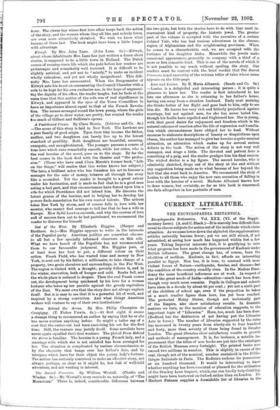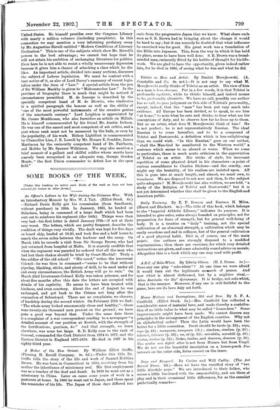C URRENT LITERAT UME.
THE ENCYCLOPAEDIA BRITANNICA.
Encyclopaedia Britanniea. Vol. XXX. (VI. of the Supple mentary Issue). (A. and C. Black.)—It is scarcely less difficult than usual to choose subjects for notice out of the multitude which claim attention. As we come lower down the alphabet the supplementary articles naturally become fewer; yet we are still struck, if not astonished, at seeing how much has happened within but a few years. Taking Imperial interests first, it is gratifying to note what progress has been made in the government of Kashmir under British influence. The great change has, of course, been the abolition of serfdom. Kashmir, in fact, affords an interesting parallel to Egypt. Man has, it is true, to contend with more violent forces of Nature—earthquake, famine; and disease—but the condition of the country steadily rises. In the Madras Presi- dency the same beneficial influences are at work. In respect of one of the great needs of India—education—much has been done, though very much more remains. Pupils in Colleges and schools have risen in a decade by about 65 per cent.; yet not a sixth part of the children of school age, even if the proportion be taken at a much smaller figure than here, has yet been reached. The protected Malay States, though not technically part of the Empire, also show satisfactory results. In domestic matters we turn, as the mention of education suggests, to the important topic of "Libraries." Here, too, much has been done. (Bedford has the distinction of not having put the Libraries Acts in force.) The number of libraries supported by the rates has increased in twenty years from ninety-six to four hundred and forty, more than seventy of these being found in Greater London. The great libraries show satisfactory results in growth and methods of management. It is, for instance, a notable im- provement that the titles of new books are put into the catalogue of the British Museum every fortnight. The printed books now exceed two millions in number. This is slightly in excess of the real, though not of the nominal, number contained in the Biblio- theque Nationale in Paris. The Bodleian reckons its possessions at six hundred thousand. It would be interesting to know whether anything has been executed or planned for the utilisation of the Stuckey Lean bequest, which, one can hardly help thinking, might have been bestowed on Oxford rather than onLondon. Dr. Herbert Putnam supplies a formidable list of libraries in the united States. He himself presides over the Congress Library with nearly a million volumes (including pamphlets). In this connection we may mention a very informing prefatory essay by Mr. Augustine Birrell entitled " Modern Conditions of Literary Production." This is one of the subjects which show Mr. Birrell's powers to the best advantage ; we cannot but hope that he will not attain his ambition of exchanging literature for politics. EVen here he is not able to resist a wholly unnecessary digression because it gives him a chance of attacking a class which he dis- likes. An important article, divided into many sections, discusses the subject of Labour legislation. We must be content with a bare notice of it, as also of Lord Davey's summary of recent legis- lataon under the item of " Law." A special article from the pen of Sir William Markby is given to " Mahommedan Law." In the proVince of biography there is much that might be noticed if circumstances permitted. M. de Lesseps is described by the specially competent hand of M. de Blowitz, who vindicates in a spirited paragraph the honour as well as the ability of "one of the most powerful instraments of the creative genius of the nineteenth century." Lord Leighton is appreciated by Mr. Cosmo Monkhouse, who also furnishes an article on Millais. He is himself commemorated by his friend Mr. Austin Dobson. He was one of the sanest and most competent of art critics, and a poet whose rank must not be measured by the bulk, or even by the popularity, of his work. Bishop Lightfoot is commemorated by Chancellor Lias, J. R. Lowell by Mr. Horace E. Scudder, James Martineau by the eminently competent hand of Dr. Fairbairn, and Moltke by Mr. Spenser Wilkinson. We may also mention a brief memoir of a gallant and skilful soldier whose merits have scarcely been recognised in an adequate way, George Gordon Meade, " the first Union commander to defeat Lee in the open field."











































 Previous page
Previous page